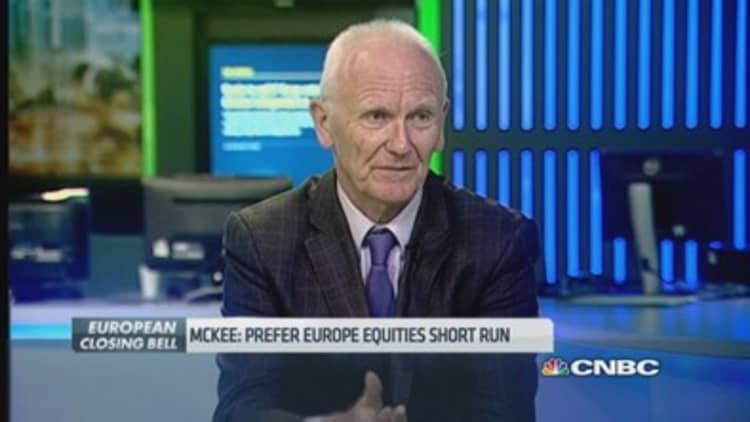Europe's government bond market may have received a new lease of life from anticipation of quantitative easing in the region, but for some strategists, it's time to eye an exit.
The benchmark 10-year Bund yield, which moves in the opposite direction to the price, has fallen 14 basis points to around 0.37 percent since the European Central Bank (ECB) said in January that it would pump 60 billion euros ($67 billion) a month into the region's economy via a bond-buying program to boost growth.
That asset-purchase programme, also known as quantitative easing, is due to begin this month.
"If you just look at the levels of yields it almost seems like a no-brainer (to be underweight German Bunds)," Valentijn Van Nieuwenhuijzen, head of strategy multi-asset at ING, told CNBC on Wednesday.
"We have reached extreme or overbought levels and with everything we are seeing in the European economy, the likelihood is increasing that yields are unlikely to fall much further."
Read More Contrarian call? Why you should be cautious on Europe
In fact, across the euro zone, yields on many short- to mid-dated bonds have turned negative in recent months. Germany's 5-year yield, for instance, is at -0.06 percent and France's 2-year yield is at -0.123 percent.
Analysts said that since markets tend to price in quantitative easing ahead of the actual programs, the boon to euro zone government bond prices from the ECB's QE program has probably already been felt.
It begs the question of whether investors want to continue to hold an asset that has seen stellar gains in recent years.
"My biggest fear this year continues to be fixed income. To me it looks just as overvalued as equities did in 2000 and that's why we continue to be underweight," Lothar Mentel, chief investment officer at Tatton Investment Management, told CNBC last week.
Stellar run
Against a backdrop of easy monetary policy and weak economic growth, bond yields in the U.S., Europe and Japan have fallen sharply in recent years – defying expectations for a turnaround.
Over the last five years, Germany's 10-year Bund yield has fallen more than 80 percent, while the yield on the benchmark 10-year U.S. Treasury note has tumbled about 43 percent.
Read More Negative yields: What could go wrong?
"It looks like the bond market is expensive," Guy de Blonay, a fund manager at Jupiter Asset Management said Wednesday. "I focus on the equity market which will continue to benefit from the low interest-rate environment and will be a substitute for what cannot be found in the bond market."

Analysts pointed to an improving outlook for the euro zone economy as another reason why government bonds are reaching a turning point.
Data on Wednesday showed euro zone business activity continued to expand in February, with Markit's purchasing managers' index (PMI) rising to 53.3 in February from 52.6 in January. Meanwhile, figures last week revealed that deflation in the region eased.
"The real economy in the euro zone is starting to bottom out, especially in the periphery -- Spain, Italy," said Bob McKee, chief economist at Independent Strategy.
"It seems that some investors still want to be in bonds, they see it as a place to be safe… But there's not much further yields can fall -- 60 percent of German bond yields are in negative territory."
Follow us on Twitter: @CNBCWorld


